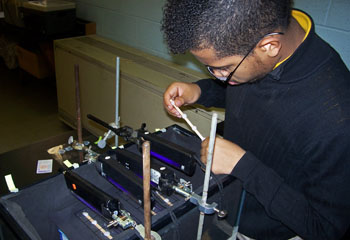From Honorable Mention to First Place
April 14, 2011 - “I just thought nanotechnology was fascinating.” Not many 17-year-olds would share that sentiment, but those were John Arnault’s exact words when describing his experiences in a collaborative project that is bringing cutting-edge science into Philadelphia public schools.
 Called ITEST-Nano, the project is a collaboration among Penn GSE, Penn’s Nano/Bio Interface Center, and the School District of Philadelphia. Arnault, a Frankford High School junior who took home a first-place prize in this year’s Carver Science Fair, is proof of its success.
Called ITEST-Nano, the project is a collaboration among Penn GSE, Penn’s Nano/Bio Interface Center, and the School District of Philadelphia. Arnault, a Frankford High School junior who took home a first-place prize in this year’s Carver Science Fair, is proof of its success.
His project, “Sunscreen’s Entrance into the Nano World,” placed first in the Medicine/Health category at the fair. Arnault was inspired to work on this particular project and participate in the Carver Science Fair by his teacher Ralph Bouquet, a member of the TFA Corps and a recent participant in Penn GSE’s ITEST-Nano project.
ITEST-Nano (which stands for Information Technology Experiences for Students and Teachers) is an NSF-funded project directed by Penn GSE Professor Susan Yoon that aims to get Philly’s students and teachers excited about science and math.
Yoon explains that as the School District of Philadelphia sustains budgetary woes and program cutbacks, administrators are turning their focus to the fundamentals of reading and writing. Some fear that STEM subjects are being left behind and students are not getting valuable opportunities to pursue careers in fields like science, technology, engineering, and math. “We are trying to increase the motivation and interest in science in urban schools,” Yoon says.
For the past four years, Yoon and her partners have hosted Philadelphia teachers for three weeks of intensive professional development over the summer. The teachers learn about nanotechnology during the first week, the pedagogy of teaching STEM subjects the second week, and problem-based learning scenarios to integrate into their classrooms the third week. Then, during the school year, the teachers implement what they’ve learned.
“The fact that we can take some of the science and research and technology [available at Penn’s Nano/Bio Interface Center] and bring it down to the high school level is just great stuff,” says Yoon. “We’re really interested in helping students take more science as they get older and pursue science in college and their careers.”
For Arnault, the project has been transformative: “Science in college is a definite,” he says. Last year, Sarita Saju, a junior at George Washington High School, also won an award at Carver after working with her teacher as part of ITEST-Nano.
Arnault explains that when he transferred to Frankford High School for the 2010-2011 school year to play sports, he didn’t do well in classes at first. But Bouquet saw his potential, and having recently participated in the ITEST-Nano summer professional development, invited Arnault to participate in the Carver Science Fair. Arnault confesses that he only spent a week on his project for the 2010 fair, but still walked away with an honorable mention. “I could’ve done better last year,” he admits.
The atmosphere at Carver has inspired him, and he has begun researching what he needs to do to get into college for science or medicine. “I tried to find one branch of science I don’t like and it’s really hard for me to find it. They’re all interesting,” Arnault says. “I’m definitely going to get into neuroscience, but I want to keep my options open, and maybe minor in computer science.”
“His experience with science really changed his perspective and how he valued his education and science,” Bouquet says. “To have a student compete against some of the top schools in the District and come out on top is very impressive.”
This summer, Yoon and her partners will pilot a curriculum book with the final cohort of teachers in ITEST-Nano. “We are really hoping that, working at the teacher level, we’re going to work with them on increasing their knowledge and pedagogical skills,” Yoon says. “And in the event that the School District opens up or there’s more room to do science, they’ve got the knowledge and the skills to be able to carry this forward with other teachers.”
